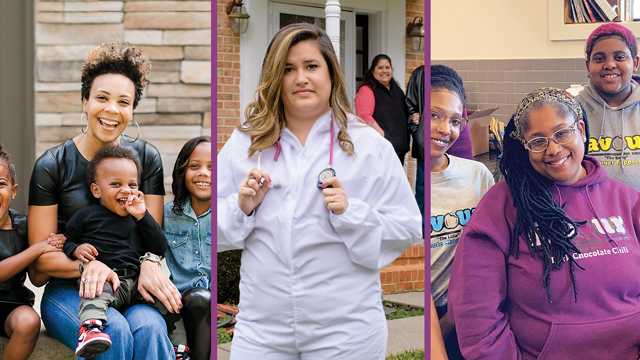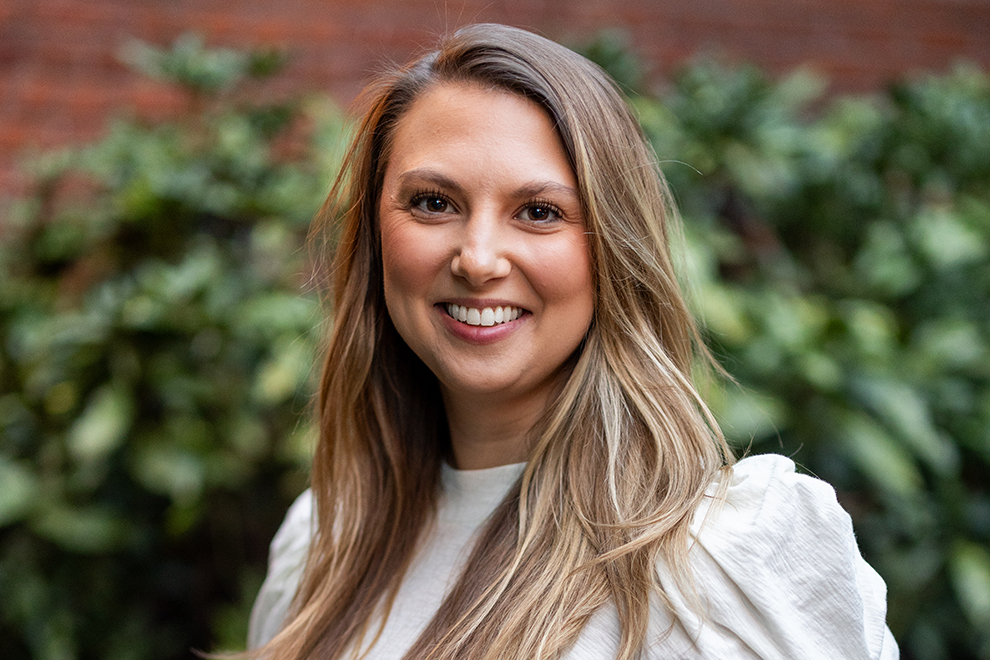“The second quarantine was harder than the first.”
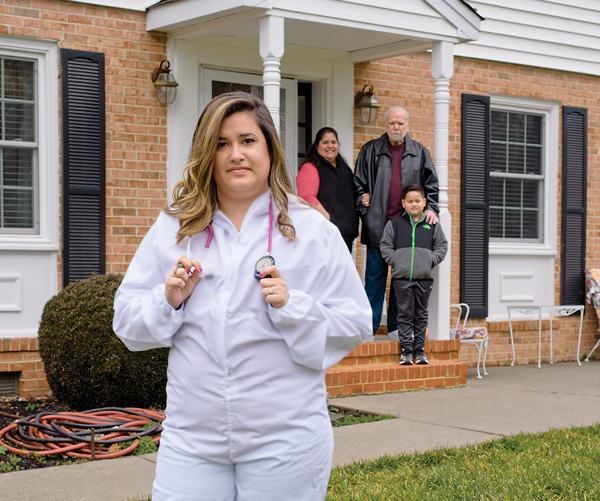
As resident care director at Spring Arbor of Salisbury, an assisted living facility in Midlothian, Maria Colon, LPN, knows about medical protocols and how to prevent illness from spreading. On March 6, 2020, with warnings about a new, highly infectious virus sweeping across the country, Colon took her then-7-year-old son to live full-time with her parents.
“It was so difficult to make that decision,” Colon says. “I was worried how it would affect him mentally and emotionally. Would it be too much for my parents to handle being a ‘parent’ for a young child again? But I knew I would be working sixteen to eighteen hours a day, and it would have been too much for me to focus on work and also have the stress of wondering if my son was okay.
“None of us thought it would be as long as it was,” she says, adding that her son lived with her parents for three months, until June 6.
Colon, who had been on medical leave following foot surgery in February 2020, returned to Spring Arbor in early March 2020, ahead of schedule. The facility had lost roughly 75 percent of its staff. “Some left because they were afraid of COVID, some were sent home to quarantine since they were exposed, and some had to stay home due to COVID symptoms or they were positive,” she says. But Colon knew she was needed.
“I came back on a scooter,” she says, noting that she had a 22-day stretch of 18-hour days, a far cry from her pre-pandemic schedule of nine to six, Monday through Friday. “We depended on the staff we had left to pick up as many extra shifts as they could and to contract with agency companies in order to have enough staff to care for our residents.”
Pre-COVID, Colon’s son attended public school in Chesterfield County and went to his grandparents’ house at the end of the day, spending time with his grandfather, who is retired, and his grandmother, who still works. When she decided it would be best for her son to live away from her, it was a comfort, Colon says, knowing her son was in a familiar, loving environment.
“My parents did a great job keeping his emotions in check,” she says. “He’s old enough to understand the virus, and he was worried about me. Mom stepped up with a homeschool routine, and my dad took care of everything else he needed,” even going so far as to call Colon to find out how her son tops his hot dogs.
FaceTime phone calls and occasional visits – with Colon decked out in a hazmat suit her mother purchased online – helped Colon keep up with her son, but it was far from typical. Once the Chesterfield Health Department said facility residents could exit quarantine, Colon waited another week, to make sure she wasn’t contagious, and then went to pick up her son.
“It was so exciting, and it was also very weird,” she says. “It was like he had been on a long vacation. He was really excited to come back home; it’s like all the puzzle pieces were back. Even the dog was excited.”
Life resumed some normalcy in the fall, as Colon arranged for an in-neighborhood day-and-school care setting for her son. At the end of the day, when Colon would pick him up, they had a routine. “He knew not to touch or hug me; he would get in the back. When we got home, he’d watch a show while I went upstairs and cleaned up with new clothes.”
But on January 7, Colon took her son back to her parents, following a new cluster of COVID cases in her facility.
“I think this second go-round is harder for him,” she says. “No one knew initially how long it was going to be, so we were hopeful every week. This time, it was really hard for him, because he knew how long it was last time.”
Colon feels she doesn’t have a choice.
“Everyone depends on me: residents, staff, families, my family,” Colon says, sharing that she’s back to working 70-plus hours a week and has added an antidepressant medication and occasional moments of ugly crying to manage the stress. She credits her employer for proactively reminding staff, early in the pandemic, about available supports, including therapy.
“When I took my oath to become a nurse, I never expected to work during a pandemic,” she says. “All the citizens who don’t believe in masks or don’t want to follow the precautions don’t see this side of things. The healthcare field is exhausted – physically and emotionally. We’ve seen people die, and we are the only ones to be with them at the end of their lives. Families’ lives have been shattered because of the virus. All we ask is for people to wear a mask, wash their hands, and socially distance themselves in hopes that all of us in the healthcare industry can have our lives and families back to normal.”
Photo: Scott Schwartzkopf
“In ten months, I have not had a single day off.”
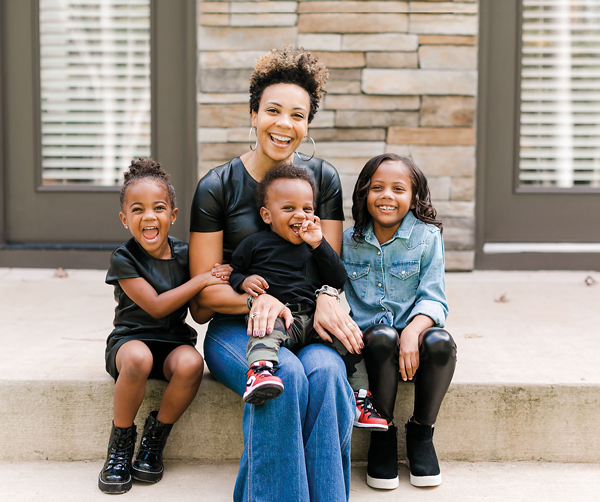
Erica Brunt, a married mom of three children under seven, has worked full-time throughout the pandemic without a day off, even changing jobs in December 2020.
Brunt and her husband, who often travels for his job, were caught off-guard in March when their childcare provider closed for two weeks, then four weeks, and then permanently – and they were still tending to their jobs. A staff member from the childcare center offered to watch the children in the family’s home, which worked well for the preschoolers, but left the first grader mostly on her own, which quickly became a nightmare, Brunt says.
“She needs structure and organization [for school],” Brunt says. “We bought as many workbooks as we could and tried to keep her on task. She did so much on her own, I called her a little college student.”
Over the summer, the childcare worker was able to find another job, and Brunt located a new childcare facility for the younger children.
For the current school year, the now second-grader goes to Greenwood Elementary every day, thanks to a Henrico Education Foundation-funded program that offers supervision for virtual learning as well as after-school activities. Even with that classroom setting, Brunt notes, her daughter has struggled.
“She needs a teacher to help her along, to help her be organized, to learn the foundations of life,” Brunt says, adding that she has worked with her daughter’s teacher to develop strategies to keep her daughter organized and attentive.
Brunt credits her employers – Truist Financial at the start of the pandemic and now CarMax – for being supportive. “The biggest positive out of all this: Both [companies] have been great about the pandemic,” she says. “If I’m drowning in work, it’s because of me. I want to do my part; I’m not going to take advantage.”
Where she has some frustration, Brunt admits, is with volunteer organizations that continue to act as though participants can engage in the same way they had before the pandemic. The challenge? A weeknight meeting that Brunt would have once hired a babysitter for now takes place via the family computer in her house, with all her children around her.
“I’m not calling babysitters now,” she says. “I don’t want [a COVID-19 risk] to shut down my husband’s job or the daycare, and I don’t want to put my mother at risk or my 89-year-old grandmother I see every Sunday.
“But the meetings continue. People say the right things, and I think their intentions are good,” she says. “I’ve told my mom, I don’t want to be a negative Nellie – I know we want to stay connected and be sisterly – but I am literally drowning.”
Brunt exercises every morning before work and talks to her friends on her lunch break, “to shoot the breeze,” she says. When asked what she’s watching on streaming services, she laughs. “I’m not caught up on Netflix; when I try to watch it at night, it just watches me.”
Mostly, Brunt says, she’d love to know that others see her pain. “These weekend and afternoon [organization] meetings make me feel guilty because I’m not doing my part, but it’s a pandemic, so I just can’t. I just want thirty minutes to be quiet.
“I just want people to think about people with small children; there’s no off button,” she adds. “There is no day off.”
Photo: Kristi McKeag
“We can’t win everything… so we might as well be conscious about what we decide.”
 The stress felt by working mothers is real, says Katherine Wintsch, founder of The Mom Complex, a company that researches moms’ experiences and emotions, and translates those findings into actionable steps – for moms and businesses. Quantitative and qualitative data already reflect how the pandemic has hurt working moms
The stress felt by working mothers is real, says Katherine Wintsch, founder of The Mom Complex, a company that researches moms’ experiences and emotions, and translates those findings into actionable steps – for moms and businesses. Quantitative and qualitative data already reflect how the pandemic has hurt working moms
in particular.
According to Forbes, women lost 5 million jobs in 2020. “We know that women of color have experienced even greater job loss than white women: The number of Hispanic women in the labor force has dropped 7 percent, Black women 5.6 percent, compared with white women at 3 percent,” says Wintsch. “Women in general are more likely to be working in the fields of hospitality, education, retail, and healthcare, which have been hit the worst. Women of color may have less access to sufficient childcare and have inflexible [positions].”
To gauge women’s emotional burden, Wintsch’s company developed the Passion and Pain app that asks participants to log their emotions as they feel them. “What we’re seeing from that is a lot of mothers suffering in silence,” she says. “The external pain point is the pandemic; we hear about all the lows that come with that. The internal struggle is [women believe] they should be handling [the situation] better,” Wintsch says. She adds that mothers appear to be holding themselves to the same expectations pre-pandemic as they are now. “They are just crumbling.”
Wintsch’s 2019 book, Slay Like a Mother: How to Destroy What’s Holding You Back So You Can Live the Life You Want, tackles common pitfalls for women, including unrealistic goals, excessive worry, and weak boundaries.
In the midst of a global pandemic, she says, it’s not only important, but critical for women to cut themselves some slack. “Living through a pandemic is a struggle; believing you suck because you’re not doing it better is suffering,” she says. “From a mental standpoint, at the beginning, many women thought, ‘I’m going to nail this and figure it out.’ Now, we’re seeing a resignation of ‘I’m just going to do the best I can; I’m not in control, [so] as long as I can do the best I can, that’s all I can really do.’”
In online sessions with women, Wintsch encourages participants to write “I expect this to be hard” on several sticky notes, then post them in visible locations.
“When you need it, you remind yourself it’s hard, and that’s why you’re having a hard time, not that you’re a loser,” she says. “I remind women all the time, ‘You’ve never done this before; why would you be good at it?’ That’s what breaks my heart: Mothers aren’t giving themselves a break. They think they shouldn’t miss a beat. I think it’s okay if we miss a beat.”
“2020 was going to be our year to pop out. What happened was COVID.”
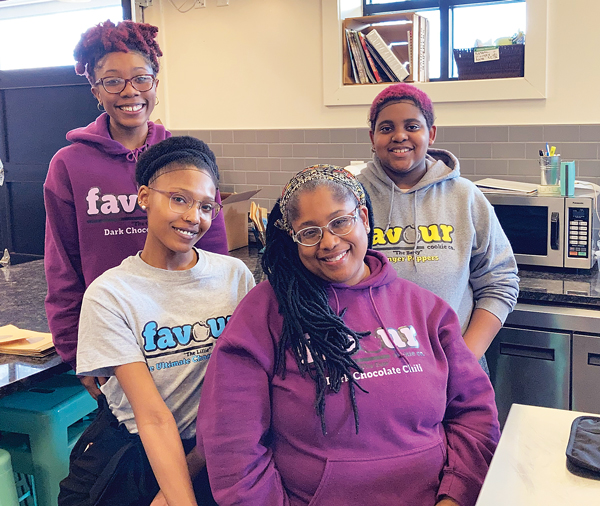
Sequoia Ross, an instructional assistant for Richmond Public Schools and owner of Favour Cookie Co., entered the pandemic with a concern not many others had.
“We had a freezer with 2,000 balls of dough, and we didn’t know what to do with it,” she says. “We were in a panic, because I didn’t know what I could do as a food provider – if we could share food or sell food. We had planned to sell to colleges, hotels, etc., but we started bagging and delivering directly to consumers. [The shut-down] changed the whole business plan.”
Favour Cookie launched in 2017 and has avoided debt thanks to East End Entrepreneurship grants funded by a partnership between Bon Secours and the Virginia Local Initiatives Support Corp. Using Parsley’s Kitchen, a commercial space on Nine Mile Road, Ross is pursuing her goal of creating vegan cookies that anyone – not just someone eating vegan – would be happy to eat.
Pre-pandemic, Ross managed her RPS and Favour work lives alongside her 13-year-old and 4-year-old daughters, relying on a network that included her biological mother and another couple she calls her “bonus” parents. “I had all my balls in the air,” she says. “The kids were being shuttled around; it was a crazy system, but it worked. My kids saw me working.”
Once COVID-19 shut down in-person school, Ross began working from home, alongside her younger children, while her oldest child continued with college in Chicago. She navigated the summer with family assistance, but the advent of a new school year in the fall brought the need for additional help – in the form of her 25-year-old daughter, who returned to Richmond and is now working in the business.
The year hasn’t been all bad, she says. “It was a blessing because I was able to spend more time with my kids,” she says, adding that her stress level is lower now than a year ago.
“We have been really safe, keeping our cluster very secure, but not allowing [the virus] to control our lives,” she says. “We are being mindful of masks, handwashing, hand sanitizer. If I had known last March that everything I already do was going to keep me safe, I wouldn’t have been as stressed.”
Photo: Amir Williams


